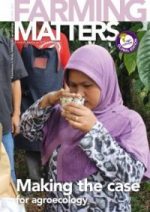Deadline 1 december 2016

For many people, food sovereignty remains an abstract term. Therefore, Farming Matters believes the time has come to ‘unpack’ it. What does food sovereignty look like in practice? And how is it taking shape in Europe, specifically? How do efforts to gain food sovereignty in Europe influence the rest of the world?
Food sovereignty is about people’s right to healthy and culturally-appropriate food produced through ecologically sound and sustainable methods, and their right to define their own food and agriculture systems. In 1996 the international peasants’ movement La Via Campesina, coined ‘food sovereignty’ as a policy framework that offers alternatives to the industrialised food and farming systems. In 2007, an alliance of social movements came together in a town called ‘Nyéléni’, located in Mali and formulated a vision on food sovereignty that has inspired farmers, academics, consumer groups, policy makers and activists around the world, including in Europe.
This process was a catalyst for European civil society. The second Nyéléni Europe Forum for Food Sovereignty will take place in Romania from 26-30 October, 2016, following the 2011 Forum in Austria. The event will bring together about 600 active citizens who are part of a growing food movement in Europe. They will share experiences and coordinate their strategies to reorganise food and farming for sovereignty.
Farming Matters will not only share the outcomes of this unique process, but also present ongoing initiatives in Europe in which people are claiming and building their own food sovereignty. This issue will showcase the strategies that food producers and (urban) citizens developed to create space for them selves in the context of the great economic power of large multinationals and supermarkets, low prices, high debts, a highly developed industrial production model, deserted rural areas, expensive land, financial crisis, and strict regulations that disfavour small producers.
What does food sovereignty mean to people in a European context? What are the groundbreaking experiences where consumers and producers create direct linkages and new markets? Where and how do new farming practices flourish? Why were these initiatives successful? What difficulties were encountered during these initiatives and how were they overcome? What is the role of youth? How has policy been helpful or not? What can be learnt from these experiences? What can be said about the role of movement-building?
Farming Matters aims to capture a range of initiatives related to food sovereignty from different parts of Europe, but also welcomes experiences that highlight the way that food sovereignty, or lack of it in Europe influences the rest of the world.
Articles for the March 2017 issue of Farming Matters should be submitted before 1 December 2016.


